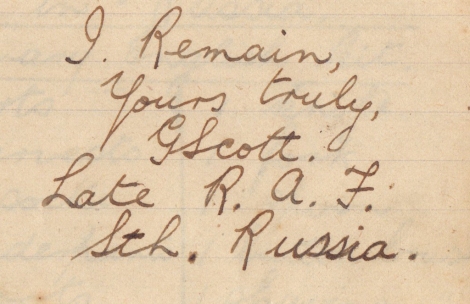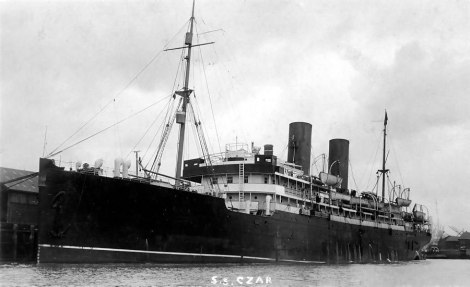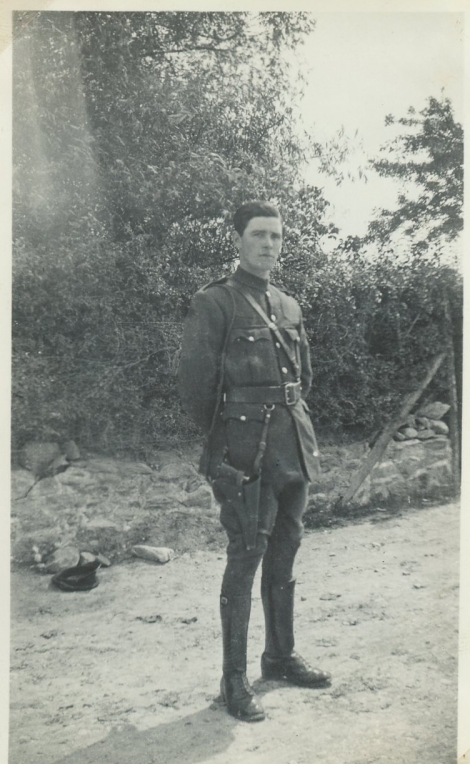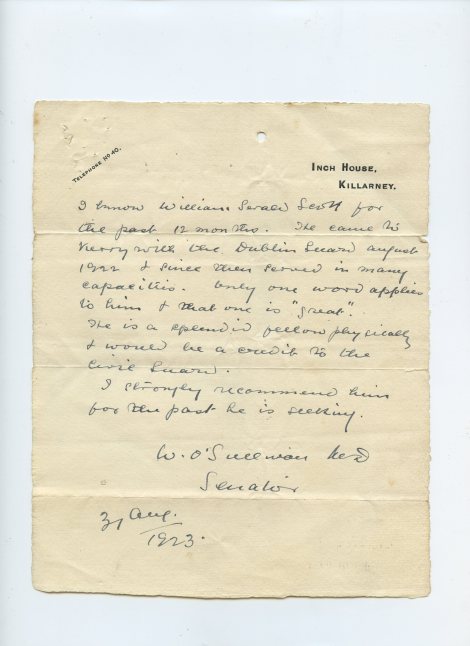
We embarked on the “H.M.T. Czar” at Port Said at 11 am en-route for England via Malta and Gibraltar (Spain) & sailed at 3pm on the same date. We arrived at Malta at 12 noon on Sunday 13th June 1920 & sailed again at 5pm on the same date. We sighted the coast of Northern Africa at 10 am on Monday 14th of June 1920 & did not lose sight of it until 11am on Tuesday 15th June 1920. At 8am on Wed. 16th June we sighted the coast of Spain. We arrived at Gibraltar at 5pm on the same date & sailed again at 12:30 pm on Thursday 17th June 1920. We sighted the coast of Portugal at 7am on Friday 18th June 1920 and it was still in sight until 7pm on the same date.
There is not a lot left to say. The adventure was over. Malta, where we anchored in the sparkling seas under the yellow walls of Valletta, quickly receded aft along with all traces of exotic, warmer climes which had barely teased the edge of the voyage, the dark heart of which, Russia, much have seemed already like a dream, or possibly a nightmare.
The H.M.T. or S.S. Czar was used to transport British Troops throughout 1919 and 1920 primarily from the Mediterranean to Britain but also served in the North Russian campaign.

SS Czar in May 1920, preparing to pick up granddad. By Unknown – http://ca.geocities.com/volturno@rogers.com/volturno63.html, Public Domain, https://commons.wikimedia.org/w/index.php?curid=4471089
The next dry land my granddad’s feet would walk would belong to a nation that Ireland were at war with. During his week-long voyage home, the Royal Irish Constabulary (RIC), an organisation caught between their British employers and a variety of revolutionary organisations and who by April 1920 had left much of the country in the hands of the IRA, finally mutinied after a speech from Lieutenant Colonel Bruce Smyth who announced at Listowel on the 19th of June that martial law would be complete on June 21st, the day my granddad would arrive back in Southampton. Smyth, who was accompanied by General Tudor, Commander of the Black and Tans, a force created by the British from ex-servicemen and deployed to Ireland in March 1920, announced that the RIC would…
‘…wipe out Sinn Fein and any man is not prepared to do this is a hindrance and had better leave the job immediately.’
Constable Jeremiah Mee responded by taking off his cap and arms…
‘By your accent you are English and in your ignorance you forget you are addressing Irishmen. These too are English, take them and go to hell you murderer.’
Smyth ordered Mee arrested but his colleagues refused to do so. Smyth was assassinated by the IRA a month after his speech (Coogan, 2016, p.160-162).
Granddad was deemed discharged as of his leaving Russia in April 1920. He probably went straight back home to Dublin. He was certainly there to witness the gunning down of Sean Treacy who was responsible for igniting the War of Independence with his cold-blooded killing – along with Dan Breen and Seamus Robinson – of two RIC men in Solheadbeg, Tipperary, in 1919 (Coogan, 2016, p.61-62). Granddad went to work at the British Ordnance depot at Islandbridge Barracks, Dublin, as a stores clerk. Incidentally one of Michael Collins squad, Mick McDonnell, had a connection at Islandbridge who managed to pass him much needed arms at this time (Coogan, 2016, p.76-77) but there is no mention of a name.
Many Irish men had served with the British Army, mostly due to the poverty endured in Ireland, exacerbated by the Great Lock Out of 1913. The general public was more concerned with surviving than with creating a new country and the rebels were quite often disapproved of. The Rising of 1916, perpetrated by a small group of revolutionaries the leaders of whom were executed by the British, did in one week what the work of many Irish politicians had failed to do in decades and swung popular opinion behind the rebels. Still, even though granddad’s younger brother Walter (age 8) and his mother Annie were both shot on the streets of Dublin during that dreadful week it is likely granddad had no particular qualms about serving with the British Army in South Russia and afterwards for the civil service. Money was probably needed as, his father, William, a dredging captain in the port, had died from pneumonia after being thrown by a breaking hawser in the water between a dredger and the quay wall just before the Rising. You can read about that here. Incidentally, Walter was possibly a victim of a ship too, the British gunship The Helga. He would die of his head wound after two months.

Gerald Forbes Scott in Kerry, 1922.
Granddad joined the Free State Army after being discharged from Islandbridge when the government changed. He served his time in Kerry which saw much of the action of the civil war which was fought between the pro-treaty and ant-treaty factions, action which no doubt unphased him after his time in South Russia.
In October 1923, granddad joined the Irish State’s new police force, The Garda Siochana, helped by a glowing reference from pro-Treaty Senator William O’Sullivan of Killarney, Co. Kerr. O’Sullivan had been under threat from the Black & Tans during the War of Independence, and he had to leave the country at one point. O’Sullivan, one of the first members of the Irish Senate (Seanad), which sat in December 1922, along side W.B. Yeats and Oliver St. John Gogarty.

Back on board the H.MS. Czar these things lay ahead…
We entered the world famous Bay of Biscay at 11 pm on the same date. A few hours before we entered the Bay of Biscay we saw two big sharks close to the side of our ship.
The Bay of Biscay is famous for sinking ships which is illustrated by a story that an old sea-captain related to me, in between dull stories about prostitutes, about a man he knew who had been wrecked in the Bay of Biscay one dark and stormy night. Tossed about on the black surface, his life jacket pinging out his distress, resigned to whatever fate had in store, he noticed another sailor sliding down a huge wave towards him.
‘Hello…’
….said the newcomer when he finally arrived in the watery trough in which our friend floundered…
‘…and which ship are you from?’
Both apparently survived. It is a story my granddad would have appreciated.
What type of shark is anyone’s guess. Whale sharks, Basking Sharks, Hammerhead Sharks and even Great White Sharks are present in the Atlantic along with many smaller species and in greater numbers then I presume. Sharks are an ominous presence. As the mighty whale, surfacing and spouting, marked granddad’s passage from the known to the unknown on the voyage out, the sharks, lurking below the surface of the wild Atlantic, menacing and huge, foretold of perils ahead, perils which we may have no choice but to investigate further….
We arrived at Southampton at 10am on Monday 21st June 1920 & disembarked at 11am on the same date. We left Southampton on the 3:30pm train for our depot in Uxbridge and arrived at Uxbridge at 8pm on the same date. On the following day Tuesday 22nd June 1920 at 2pm we were demobilized.
I Remain,
Yours Truly,
G. Scott.
Late R.A.F
Sth. Russia.
Further Reading & references
Coogan, Tim, Pat, (2016), The Twelve Apostles, London:Head of Zeus.
Duffy, Joe, (2015), Children of the Rising, Dublin : Hachette.
Humphreys Family Tree, (2018), Dr. William O’Sullivan, [online], available at http://humphrysfamilytree.com/OMara/dr.william.osullivan.html

The journey home is so much less eventful than the journey out. That must have given all of them too much time to brood on what they’d seen.
LikeLiked by 1 person
Yes I think you are right April. Places that once looked strange and exotic had paled into insignifigance in the face of the impact of their experience.
LikeLiked by 1 person
What a life Grandad lived. I’ve so loved reading these posts so am sad it’s ending.
LikeLiked by 1 person
Ta CJ……its not over yet!…I’ll take a wee break and come back with more on the Irish episodes soon…
LikeLiked by 1 person
Oh excellent! Will look forward to them.
LikeLiked by 1 person